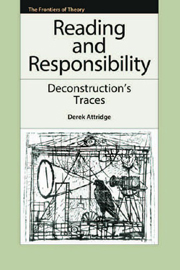Book contents
- Frontmatter
- Contents
- Acknowledgements
- Series Editor's Preface
- Introduction
- 1 Derrida, Deconstruction and Literary Criticism
- 2 Deconstruction Today: Literature, Postcolonialism and the Secret
- 3 Following Derrida
- 4 The Impossibility of Ethics: On Mount Moriah
- 5 Arche-jargon
- 6 Deconstruction and Fiction
- 7 Posthumous Infidelity: Derrida, Levinas and the Third
- 8 Roland Barthes's Obtuse, Sharp Meaning and the Responsibilities of Commentary
- 9 Nothing to Declare: J. Hillis Miller and Zero's Paradox
- 10 Radical Atheism and Unconditional Responsibility
- 11 The Place of Deconstruction: A Conversation with Jean-Michel Rabaté
- Bibliography
- Index
9 - Nothing to Declare: J. Hillis Miller and Zero's Paradox
Published online by Cambridge University Press: 12 September 2012
- Frontmatter
- Contents
- Acknowledgements
- Series Editor's Preface
- Introduction
- 1 Derrida, Deconstruction and Literary Criticism
- 2 Deconstruction Today: Literature, Postcolonialism and the Secret
- 3 Following Derrida
- 4 The Impossibility of Ethics: On Mount Moriah
- 5 Arche-jargon
- 6 Deconstruction and Fiction
- 7 Posthumous Infidelity: Derrida, Levinas and the Third
- 8 Roland Barthes's Obtuse, Sharp Meaning and the Responsibilities of Commentary
- 9 Nothing to Declare: J. Hillis Miller and Zero's Paradox
- 10 Radical Atheism and Unconditional Responsibility
- 11 The Place of Deconstruction: A Conversation with Jean-Michel Rabaté
- Bibliography
- Index
Summary
‘The critic keeps wanting to add just one more word, in the futile hope of making it all clear’. Thus Hillis Miller, in an essay entitled ‘Zero’ (388). Miller is talking about the effect, and the effectiveness, of Henry James's story ‘The Altar of the Dead’, but might he not, also, be talking about the impulse that has kept him producing literary criticism over so many decades, discussing author after author, text after text, passage after passage? For even though he has often engaged with the most recalcitrant and elusive of writers and writings – Kleist, James, Nietzsche, Derrida, de Man and many more – and even though his topic is very often the inexpressible or the inherently ambiguous, there is always that perceptible drive, one might even call it a compulsion, to explain, to make clear, to render as perspicuous as the intractability of the material will allow. Knowing that a hope is futile does not diminish its force and productivity, of course, and, like James's story, Miller's extraordinary career provides ample evidence of this truth.
It's not surprising, therefore, that the statement in ‘Zero’ that I began with is followed by an assurance which is offered as a reassurance to the reader: ‘This impossibility of clear understanding or expression is, on the terms of the story, a lucky thing, since to understand fully, to fill the gap, would be to be dead’ (388).
- Type
- Chapter
- Information
- Reading and ResponsibilityDeconstruction's Traces, pp. 131 - 137Publisher: Edinburgh University PressPrint publication year: 2010



